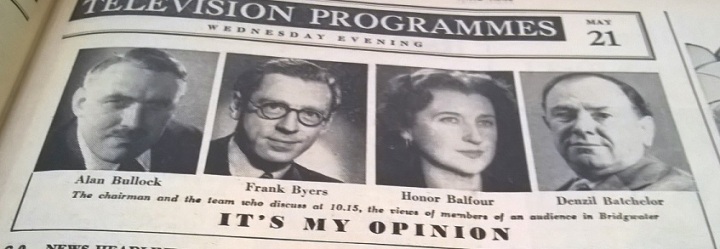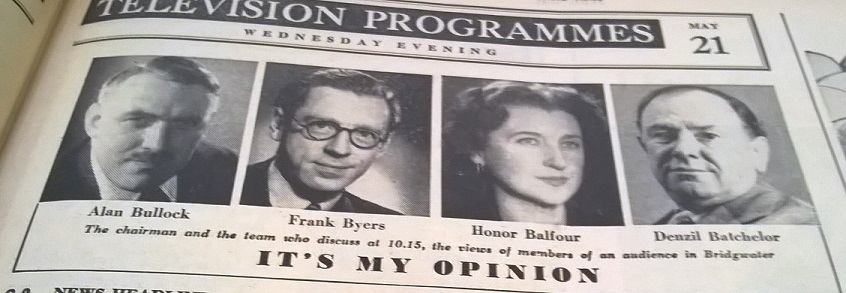Guest post by Helen Langley
One of the many highlights of the ‘Voice and Vote’ exhibition was the recreation of the Ladies Gallery (also known as “The Cage”) and the view down into the House of Commons chamber. After the Second World War when the bomb-damaged chamber was rebuilt, part of this space was reconfigured as the press gallery. In this eyrie, the British journalist and broadcaster Honor Balfour (1912-2001) sat compiling notes on the proceedings; later working them up for broadcast pieces, or longer articles for Time, the US magazine; freelance pieces for the Guardian or the Observer. She reported on such highpoints as the chamber’s re-opening in 1950; explained the lay-out and reflected on wartime fire fighters [1]; the dissolution of parliament in 1951 [2], as well as the routine – and occasionally rumbustious – parliamentary affairs. Her focus was mainly on the Commons: an item on the ‘Leader of the House of Lords’ in April 1957 [3] being a comparatively rare piece on the upper chamber.
Honor ‘On Air’
Listeners in the early 1950s who tuned their radios to catch the 10 O’clock news on the BBC Light Programme and stayed to listen to ‘Topic for Tonight’, the five minute slot which immediately followed it (originally twice a week, then expanded), often heard the voice of Honor Balfour. [4]
For over thirty years from 1945 she regularly contributed to radio programmes; talking about current affairs authoritatively and engagingly at a time when women – especially their voices – were too often dismissed as being unsuitable for tackling major issues. Her range was wide: BBC producers appreciated her rarity value. She was most frequently heard commenting on topical issues in programmes for the Home Service and the Light Programme, precursors of today’s Radio 4 and Radio 2. Honor could also be heard as an occasional panellist on programmes like Any Questions and, in the early 1970s, the innovatory phone-in programme Whatever You think (which she chaired a couple of times as holiday cover). Her stint as a presenter of the Home Service/Radio 4’s The Weekly World in the 1960s extended the remit beyond the usual run of weekly magazines like the Spectator and the New Statesmen. She survived its absorption into Radio 4’s Saturday Briefing in the 1970s but her appearances were fewer. She was also a fairly frequent contributor to the BBC’s General Overseas; the North American Services’ London Calling produced by Keith Kyle for Canadian audiences, and Forces educational services.

One of her earliest radio pieces was on 1947 Budget for listeners of Woman’s Hour. This must have gone down well in the BBC as she was recruited to do a talk on the 1948 budget. In 1949 she made her debut on the newly –launched Topic for Tonight with a talk entitled ‘Privy Council Makes News’. In March 1950 she contributed an item on ‘Women in the New Parliament’ for Woman’s Hour. [5]
In the 1955 General Election she was a member of the expert panel analysing live on radio the incoming results. [6] Honor was no stranger to General Elections: as a Liberal she had twice contested the Lancashire constituency of Darwen, in 1943 and 1945 (her political career is described in my 2013 article) but perhaps in 1955 she was too far ahead of the curve for I have found no record of her appearing again as an election analyst until 1979 when she came out of retirement to be interviewed by Brian Redhead for R4’s Countdown to No.10. [7]
Honor, topicality and television
In 1951 Honor made her debut on afternoon television chairing a live discussion in Women’s Viewpoint between the Labour MP, Jennie (later Baroness) Lee (1904-1988); the Conservative MP Pat (later Baroness) Hornsby-Smith (1914-1985), and Doreen Gorsky (1912-2001), then President of the Women’s Liberal Federation- and future women’s television pathfinder. Their subject, ‘What policies have weakened the family and what policies are needed to strengthen it’ was part of the series on ‘Home and the State’. The mid 1950s developed into the most prolific years of Honor’s television career. Her monthly ‘Topical Round Up’ slot (sometimes advertised as ‘Honor Balfour’s Round Up)’ immediately followed the women’s programmes. In July 1955 Honor interviewed a group of new women MPs. On another occasion the Conservative MP Irene (later Baroness) Ward (1895-1980) was a guest. Dame Irene, remembered by Honor in the 1990s as an admirable and unshowy MP, had been a leading campaigner for Equal Pay for Women. [8]
The range of domestic and foreign policy topics Honor addressed in her radio and television broadcasts is impressive. All this alongside her main job as the sole British member of the London staff on Time magazine. Again, as a woman, she was in a minority (as she was as a freelancer for the Guardian and the Observer) but having survived for six years as the only woman on the founding editorial team of Picture Post Honor was unfazed by the situation. But she didn’t underestimate the challenges. As she would later recall, to survive in that environment a woman had to show that she was not only as good but better than her male colleagues. Researching Honor’s journalism other now largely forgotten names came into view: a woman economist here, a woman radio producer there. Future (male) titans of the BBC. Over the coming months one of my tasks will be to place Honor’s career into the wider context. But this much is clear already: in her journalism as in her political career, she carved out a distinctive, innovatory path.
Helen Langley
Helen Langley is a historian, writer and former manuscript curator. She is currently researching an article on Honor Balfour’s career in journalism for the Journal of Liberal History.
Sources: Volumes of the Radio Times in the British Library’s Humanities Reading Room were an invaluable source, not least for the period detail contained. The digitised version of the magazine is a useful starter but the information is skeletal. The BBC Written Archives Centre’s files on Honor Balfour’s broadcasting career, and her archive in the Bodleian, are key.
Permission to quote from the Honor Balfour archive and copyright courtesy of the Bodleian Library Oxford, on behalf of St Anne’s College, Oxford. References to documents in BBC files, courtesy of the BBC Written Archives Centre.
Image reproduced with kind permission of the Radio Times.
[1] Bodleian Library, University of Oxford. MS Balfour dep. 52. 26 October 1950.
[2] Ibid. 4 October 1951.
[3] BBC Written Archives Centre (BBCWAC), Caversham. R Cont1 Talks, Balfour Honor, File 3, 1955-7.
[4] Topic for Tonight, produced by Stephen Bonarjee (1912-2003), is now regarded as the forerunner of topical radio programmes. Margaret Stewart, and Honor Croome were also early contributors but infrequent ones.
[5] BBC WAC.R Cont1, Balfour, Honor File 1, 1942-1950.
[6] This was the first time the BBC provided live coverage of the results. Honor was the only woman panellist on the radio programme. A separate panel appeared on the television programme.
[7] BBC WAC. Honor Balfour- Contributors-Speaker File 7, 1973-80.
[8] In conversation with the writer. Irene Ward had also campaigned for Indian Women’s suffrage in the 1930s. She featured in both the ‘Voice and Vote’ exhibition and the accompanying book. In 2015 this ‘Doughty parliamentarian and campaigner’ was the subject of the Speaker’s Advisory Committee on Works of Art International Women’s Day Lecture by this writer.
